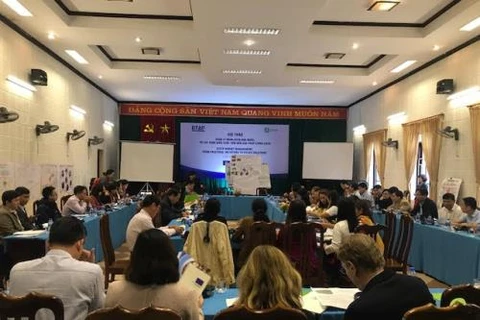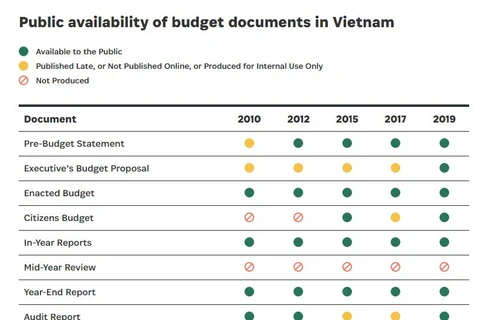
Hanoi (VNA) – Vietnam has seen considerable improvements in budget transparency at national, provincial and ministry levels, heard a project closing workshop in Hanoi on October 8.
The workshop was held to review the “Financing for Development” project conducted by Oxfam in Vietnam, Vietnam Tax Justice Alliance (VATJ), Budget Transparency, Accountability, and Participation (BTAP) Alliance, and Vietnam Mining Coalition from 2016 – 2020.
In Vietnam, people’s spending on healthcare services account for about 40 percent of total national medical expenditure, while tax incentives for businesses coupled with tax fraud and evasion are causing the loss of a huge amount of funding for public services like healthcare, said Babeth Ngoc Han Lefur, Country Director of Oxfam in Vietnam.
Vietnam’s corporate tax incentives were estimated at around 62 trillion VND (2.68 billion USD at current exchange rate) in 2016, equivalent to seven percent of the State budget revenue, she said. It was exaggerated by a staggering 15.6-20.7 trillion VND lost to tax fraud and tax evasion the country recorded between 2013 and 2017, not to mention severe corruption and money loss at public projects. These have made public services even heavier financial burdens on people, she added.
She highlighted the importance of transparency and equality in State budget collection and spending in bridging the social gap and reducing inequality.
Transparent and fair State budget collection and spending guarantee that all people, especially the poor, women and other vulnerable groups, can equally participate in and benefit from the development, she noted, adding that it is key to allow people and civil society organisations to participate in State budget management and supervision.
During the workshop, public policy experts and representatives from local administrations and local communities taking part in the project made a number of recommendations to the government. The recommendations covered three major pillars – tax, State budget transparency and participation of citizens and civil society organisations in monitoring State budget collection and spending at local level.
Nguyen Duc Thanh, Chief Advisor of the Vietnam Institute for Economic and Policy Research (VEPR) and representative from the VATJ, said to improve the State budget situation, Vietnam should, first and foremost, use the budget economically and promote rational budget allocation, instead of increasing collection through new taxes or higher tax rates. He urged the government to cut its spending first to ease public debt burden.
Increased revenues from tax collection should be spent on investment for development to boost actual economic output in the long run, Thanh said.
The project “Financing for Development” has promoted the expansion of space for communities and civil society organisations to participate in supervision of open budget and public expenditure through a number of initiatives, such as citizen budgets, public expenditure tracking, smartphone scoreboard tool M.Score that enables citizens to score performance of public administration services via their mobile phones, Provincial Open Budget Index (POBI) and Ministry Open Budget Index (MOBI).
According to a 2019 survey on OBI (Open Budget Index), MOBI and POBI, Vietnam has seen considerable improvements in budget transparency at national, provincial and ministry levels with progresses in all three aspect, namely transparency, the participation of citizens and civil society organisations and budget supervision, last year.
The government, the Ministry of Finance and cities and provinces nationwide have exerted efforts to fulfill commitments to disclosure of information regarding management and use of public resources. It has enabled citizens to take part in discussions on State budget and accelerated reforms in budget governance policies towards a more transparent approach.
Financing is not simply about money, said Nguyen Quang Thuong, Deputy Director of the Centre for Development and Integration (CDI) and coordinator of the BTAP. Financing for development is a story about how resources are used and whether they can ensure or satisfy the needs of vulnerable groups.
“In this matter, we saw remarkable changes governmental agencies have made in budget transparency and people’s power when they participate in budget management and supervision,” he said./.
























